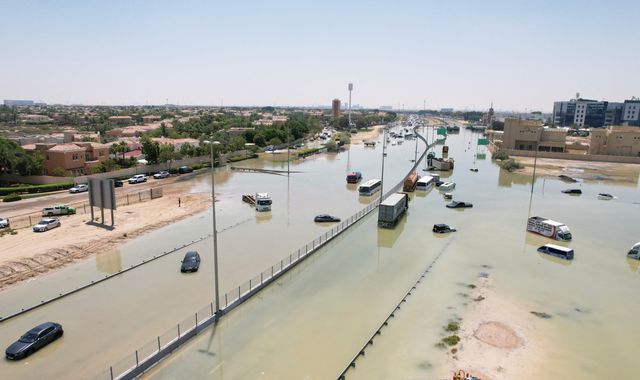On Air Now
The Evening Show with Dan O'Connell 7pm - 10pm
19 April 2024, 14:50 | Updated: 19 April 2024, 17:05

Four people died in the United Arab Emirates after record-breaking rainfall caused heavy flooding this week, officials have said.
The storm first hit Oman at the weekend, killing at least 21 people, before pounding the United Arab Emirates (UAE) on Tuesday with its heaviest rains since records began in 1949.
Two Filipina women died after suffocating inside a vehicle during the floods in the UAE, a statement by the Philippines' Department of Migrant Workers said.
Meanwhile, a Filipino man was killed after his vehicle fell into a sinkhole in the country, the department added.
An Emirati man in his 70s also died when his vehicle was swept away by floods in the northern Ras Al Khaimah emirate.
The exact number of deaths caused by the storm in the UAE is not yet known as officials there have not released any information.
The UAE, a federation of seven emirates that consists of Abu Dhabi, Dubai, Sharjah, Ajman, Umm Al Quwain, Ras Al Khaimah and Fujairah, has an arid desert climate and typically has little rainfall.
However, this week's massive storm blew through all seven of the country's sheikhdoms this week - with more than 5.59 inches of rain falling on Dubai on Tuesday.
The city has a typical yearly average of 4.7 inches of rain.
Lightning and flash floods
Lightning flashed across the sky, and it sometimes touched the tip of the world's tallest building - the Burj Khalifa.
Many roads and other areas in Dubai have insufficient drainage due to the lack of regular rainfall, causing flooding.
The main road connecting Dubai, the most populous emirate, with Abu Dhabi remained partially closed on Friday, while an alternative route saw vehicles driving through low water on the hard shoulder past abandoned cars and buses.
Read more:
What is cloud seeding and did it cause record rainfall in Dubai?
In the UAE's north, including in the emirate of Sharjah, local media reported people were still trapped in homes on Friday.
Meanwhile, long-haul carrier Emirates said on the X social platform that it would again halt local check-in for passengers traveling on its flights until early Saturday to "support operations recovery from the recent bad weather at our Dubai hub".
As of Friday morning 1,478 flights to and from Dubai had been cancelled since Tuesday - approximately 30% of all flights, according to aircraft flight tracking website FlightRadar24.
Read more from Sky News:
Iran calls Israeli strike an 'infiltration'
Key moments in the Middle East this week
US 'most wanted' fugitive arrested in Vatican
The tarmac at Dubai International Airport, the world's busiest for international travel, had been flooded on Tuesday as planes made their way around what looked more like a lake.
Early reports linked the extreme weather to "cloud seeding", in which small planes flown by the government go through clouds burning special salt flares, which can increase precipitation.
However, experts later said the practice could not have caused so much rain and the weather was more likely to do with factors including climate change.
(c) Sky News 2024: At least four dead after record-breaking rainfall in United Arab Emirates this week